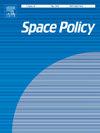为欧洲航天局寻找空间
IF 1.9
4区 社会学
Q2 INTERNATIONAL RELATIONS
引用次数: 0
摘要
欧洲在太空政策方面有一段有趣的历史,二战结束以来,欧洲利用不同的机构来实现其太空野心。其中最著名的,也是最近最重要的,是欧洲航天局(ESA),一个非欧盟的政府间机构,负责监督伽利略、哥白尼和EGNOS的发展。自2021年以来,第二个机构——欧盟空间计划局(EUSPA)已经成立,从布拉格的GSA手中接管了欧盟空间计划和旗舰星座的运营。本文讨论了欧洲空间机构的潜在未来,并批判性地分析了托马斯·霍伯(Thomas Hoerber)在2022年提出的欧空局应该成为太空大学研究所的建议。本文章由计算机程序翻译,如有差异,请以英文原文为准。
Finding space for the European Space Agency
Europe has an interesting history on space policy, drawing on varied agencies through which to pursue its space ambitions since the end of WWII. The best known, and until recently most important, of these is the European Space Agency (ESA), an intergovernmental non-EU institution which oversaw the development of Galileo, Copernicus and EGNOS. Since 2021, a second agency, The European Union Agency for the Space Programme (EUSPA), has been in place, taking over the running of the EU’s space Programmes and flagship constellations from the GSA in Prague. This paper discusses the potential future of Europe's institutions for space, and critically analyses Thomas Hoerber's 2022 suggestion that ESA should become a Space University Institute.
求助全文
通过发布文献求助,成功后即可免费获取论文全文。
去求助
来源期刊

Space Policy
Multiple-
CiteScore
3.40
自引率
36.40%
发文量
40
期刊介绍:
Space Policy is an international, interdisciplinary journal which draws on the fields of international relations, economics, history, aerospace studies, security studies, development studies, political science and ethics to provide discussion and analysis of space activities in their political, economic, industrial, legal, cultural and social contexts. Alongside full-length papers, which are subject to a double-blind peer review system, the journal publishes opinion pieces, case studies and short reports and, in so doing, it aims to provide a forum for the exchange of ideas and opinions and a means by which authors can alert policy makers and international organizations to their views. Space Policy is also a journal of record, reproducing, in whole or part, official documents such as treaties, space agency plans or government reports relevant to the space community. Views expressed in the journal are not necessarily those of the editors or members of the editorial board.
 求助内容:
求助内容: 应助结果提醒方式:
应助结果提醒方式:


